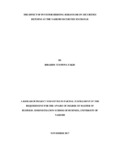| dc.contributor.author | Ibrahim, Tumpewa T | |
| dc.date.accessioned | 2018-01-31T09:15:45Z | |
| dc.date.available | 2018-01-31T09:15:45Z | |
| dc.date.issued | 2017 | |
| dc.identifier.uri | http://hdl.handle.net/11295/102978 | |
| dc.description.abstract | The aim of the study was to establish whether investor herding behaviour has an effect on securities returns at the Nairobi Securities Exchange. This seeks to bridge the gap that exists in the Kenyan securities markets where there is limited financial knowledge, filling the knowledge gap in the field of behavioural finance understanding. The main objective of the study is to inform stakeholders like the policy makers, investors and the academic on the relationship between investor’s behaviour and the securities returns at the exchange. The study used descriptive research design. The population was estimated at 1.2 million individual investors as at June 2017. A sample of 115 individual investors was used in the study. Data was collected using a structured questionnaire and secondary data obtained from the NSE on quarterly time series for a period of five years. The study found that most individual investors make investment decisions based on mass buying and selling of securities. It found that majority of the individual investors believe that investments bear positive returns even where there is evidence to the contrary. It found that that amongst most individual investors, subjective decision making played a significant role in investment decisions in the securities market. It also showed that relying on one piece of information had a great influence on decision making in securities market amongst individual investors. The study concluded that the effect of herding may also not be felt in emerging markets because of the rare nature of trading in securities due to such factors like limited capital or little information regarding the securities. The process of obtaining data for the study was tedious and costly. The cost of purchase of the data was pegged on the number of years therefore the unavailability of enough funds was an obstacle to the scope of my study therefore the higher the number of years, the higher the cost. The study recommends that trainings should be conducted to guide investors on the pros and cons associated with the trading activities at the NSE. Further studies should be done on the effect of herding behaviour on the determination of the entry and exit of a company in the NSE 20 Share Index. | en_US |
| dc.language.iso | en | en_US |
| dc.publisher | University of Nairobi | en_US |
| dc.rights | Attribution-NonCommercial-NoDerivs 3.0 United States | * |
| dc.rights.uri | http://creativecommons.org/licenses/by-nc-nd/3.0/us/ | * |
| dc.subject | The Effect of Investor Herding Behaviuor on Securities Returns at the Nairobi Securities Exchange | en_US |
| dc.title | The Effect of Investor Herding Behavior on Securities Returns at the Nairobi Securities Exchange | en_US |
| dc.type | Thesis | en_US |



